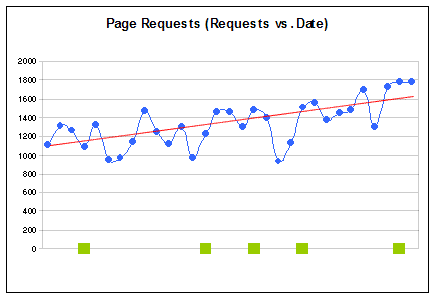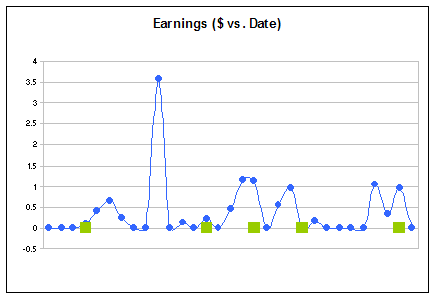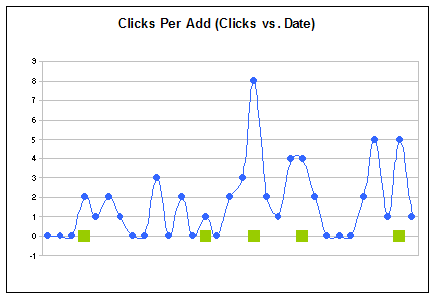How much is my writing worth? An AdSense profit ratio analysis of sorts
Tuesday, March 28, 2006
Before you read on, let me tell you what this entry is all about so that you do not waste your time: this entry is about analyzing the relationship between my web site's access log, google's AdSense reports, the number of published blog entries, and google's AdSense revenues; I have also calculated how much each word in my blog is approximately worth to advertisers.
(Even though I only analyze my web site results, the conclusions reached can probably be generalized to most blogs.) Google's AdSenseIn the past, companies tried to figure out the online advertisement business, however, not many were successful exploiting the new web medium. It took a company like google to lay the groundwork for a successful online advertising model where all parties involved benefit. (To be fair, google did not invent the AdSense model. They actually bought a company that had the AdSense model already figured out, though they did have enough foresight and clout to make it part of the web vernacular.) AdSense works as follows (well, this is my interpretation of its functioning): advertisers buy ads to be displayed in publishers' sites for a price, based on keywords that are related to the content of the web pages; when web surfers click on the ads, advertisers' accounts get charged and google makes money, which then splits the profits with the publishers. The price per click varies depending on the web site and how the context of the ad within the content of the web site is rated. In other words, not all clicks are created equal (more on this when I get to the analysis). The AnalysisGoogle provides up to the hour reports of publishers' earnings, however there is no way to tell how much each keyword is worth to advertisers (or which keyword is the one attached to content). Because you can only get rough averages from google's reports, I collected 3 separate sets of raw data spanning exactly 31 days from 3 different servers to run my own analysis and figure out how much each word I write in my blog entries is worth to advertisers. Although I can only calculate estimates, this exercise does provide a good understanding of how everything works and sheds light into the question if it is worth while for any blogger to use this type of advertising program. With a few keystrokes in a calculator, I found the following statistics: | Total Days for analysis: | 31 | | Total Page Requests: | 41,293 | | Total Page Requests with google ads: | 5,484 | | Total Blog Entries | 5 | | Total Words for all Entries: | 4,538 | | Total Clicks: | 52 | | Total Earnings: | $12.17 |
With a bit more effort, I can get more detailed information: | Earnings per Word (all pages): | $0.002681798 | | Earnings per Blog Entry: | $2.434 | | Earnings per Day: | $0.392580645 | | Clicks per Day: | 1.677419355 | | Page with ad/Total Requests: | 0.132807013 |
For a more sophisticated analysis, I took the 31 days worth of traffic, clicks per ad, revenue generated, and blog entries to generate charts and summarize the results. Charting these items allowed me to see which entry generated the most clicks per ad and how new content generates more traffic (this assumption has a few caveats that I will explain later). In order of published date, from left to right, the blog entries were: Pyramidal Paradigms (February 23, 2006)
Code reviewer == Code editor? (March 5, 2006)
The lost civilization of our past was not Atlantis (March 9, 2006)
Football - Soccer - Futbol (March 13, 2006)
How to lose market share (the Sony way) (March 21, 2006)
Efficient Financial Markets and Google Application (March 21, 2006) Page Requests vs. Blog Entries Analysis - Page requests increased throughout the period.
- There was total number of request of 41,293, with 13% of the total being from all blog entries (100+ in total, however, only the latest 5 were included for this analysis; also, only blog entry pages have google ads embedded within them).
- After the second entry, there was a noticeable increase in traffic.
Note that there are 3 entries separated by 3 days each. It seems that the higher the frequency of published entries the more visitors I got, with some topics being more popular than others.
For example, after my entry on "The lost civilization of our past was not Atlantis," my site lost around 250 unique page requests--the only reason I can think of for the substantial decrease in traffic is the esoteric topic and the length of the entry.
- It appears that the smaller the blog entry the more traffic it generates, regardless of the topic.
However, the topic for these shorter entries was "Soccer," "Sony," and "Google," which are very popular terms, so it is a fair assumption that "popular" words will generate more traffic via search results--this is something to keep in mind if your intent is to drive traffic to your web site.
- The caveat I introduced above has to do with increasing trends in traffic and the number of new blog entries: it may seem obvious that the more blog entries I published, the more traffic they generated. However, this assumption may not be completely accurate. The data does seem to indicate, though, that there is a correlation of blog entries and traffic generated, but I cannot claim it is the only reason.
The confounding comes from the organic growth of the web, i.e., if I were to stop publishing new content, the traffic will likely keep increasing as more new web surfers pop up all over the world--this should almost be an axiom of traffic growth in the internet: any site that is indexed by search bots will experience an increase in web traffic (this has probably been researched, but I did not look it up). Moreover, RSS feed readers will likely find the site and add them to their databases thus increasing traffic to any site publishing an RSS feed.
- Finally, the trend line (in red) indicates an R2 value of .4398, which is not a very high value for a coefficient of determination, but the data does seem to indicate the existence of some type of correlation of blog entries and page requests, i.e., roughly 44% of the increase of traffic could be accounted for by the new blog entries.
We cannot forget, though, that R2 values can be subject to objection in any statistical study, and, in this particular case, the correlation may be affected by other variables not accounted for in the model.
Earnings vs. Blog Entries Analysis - If web surfers do not click on the ads, there are no revenues, thus, there were days with no earnings per day. However, some entries did generate more money than others.
For example, the period between "Pyramidal Paradigms" and "Code Reviewer == Code Editor?" (or February 26, 2006 to March 5, 2006) saw a healthy amount of money being made (this means web surfers are responding to the ads).
- There was not a clear increasing or decreasing trend in the amount of money being made, which is a direct result of the number of ad clicks per page.
- I appears that the more entries there were published, the more money was made--keep in mind, though, the confounding mentioned above: new entries may not be only reason people are visiting the site or are clicking on the ads.
- There was one particular date, March 1, 2006, that generated $3.58. This amount seems to be quite high, compared to the other days. The high value per click was probably due to the word associated with the to content being served that day.
Note the Clicks vs. Blog Entries chart below and look for the same date: there were as many clicks in other days, but the earnings per click were not as high as on March 1, 2006.
Like I said, not all words are worth the same amount of money, i.e., popular words will generate more click-thrus per page (for example "make money" vs. "panda tooth brush") and advertisers pay more to get their warez displayed on web sites and consequently making more money for the publishers when users follow the links.
Although, the converse is also true: it is less likely for anyone to write about "panda tooth brushes" on a blog, so advertisers have to pay google a higher premium for this scarce resource (blogs talking about tooth brushing pandas), i.e., it is all about the supply and demand of weird content.
Clicks vs. Blog Entries Analysis - There should not be any surprise that this chart resembles the same pattern of the Earnings vs. Date chart above, i.e., the more clicks the more money is made. However, I said that not all clicks are treated equally. This fact can be explored comparing both chart, so take a few moments to compare.
- Similar to the Earnings vs. Blog Entries chart, there does not seem to be a recognizable pattern of clicks per page.
All I can say is that it appears to be a random pattern, and that I really do not know why people click on ad links, but google is banking on the fact that association of keywords to content is one of the reasons.
It seems to be a good assumption, as their stock price attests. For example, assume you are surfing around and find a page about soccer and while reading such page you remember you need to buy soccer shoes: how likely are you to click on an add selling soccer shoes? Exactly. Who knows, but some of us may click on such ads.
Is there a probability model that can be used to predict how much money a blog could make depending on the traffic per day? Perhaps a Poisson distribution would aid, but expanding on this is out of the scope of my analysis.
Conclusions- Blogging seems to be profitable, and the amount of money you make is directly proportional to he amount of traffic your site generates.
- Fresh content seems to generate new traffic.
- Blogging is important in this money making equation because, currently, it is the only way to publish new content on web sites (I do not count RSS feeds, as it a way of automatically blog without putting any effort into it; and I discard news sites, as their job is to publish new content daily).
- If you blog, the shorter the entries the better your ads are likely to perform, i.e., people quickly read what you have to say and go on to the next link--advertisers count on the short attention span of web users to catch fast clicking fingers while the context of blog entries are in users' minds.
- The more popular your blog's theme is, the more traffic your site will generate, i.e., you will eventually create a web audience for your writing, which greatly accounts for repeat visitors.
You have to be cautious of anything having statistics and summaries presented to you as graphs: you always need to ask about the sampled data and the methodology followed throughout the experiment. So, keep in mind that these conclusions have been drawn from one study and one set of data. However, my blog is just as typical as any other, among millions, so the conclusions I have drawn have a certain validity across the board. To truly make a serious statistical analysis, I would need more than 31 days worth of data, and, most importantly, I would need to make a cross-sectional analysis of different type of blogs, i.e., blogs that concentrate on politics, arts, video games, etc., etc. (This is something I am considering, given time and resources.) Social ImplicationsEven though blogging can be used to generate money through advertising, the whole blogging phenomenon was not envisioned by genius capitalists trying to make a buck out of so much free content. Blogs, at least the coinage of the term, were a purely accidental phenomenon that took roots because of the availability of computers everywhere and cheap internet connections. Many argue, as do I, that blogs are a way to disperse information to anyone who is interested and has the time to read them. Even though the information you find on the web may not be useful, well written, accurate, complete, or free of paranoic tendencies, the fact that it is available makes it one of the great achievements of our societies. At least for now, it seems to be an uncensored peek into many minds around some parts of the world. So, if you have a blog, do not compromise on a topic or set of keywords to generate the most money from these advertising programs. Write as you will, I say, and if your content is interesting enough, you will find a web audience. As I wrote in the beginning of this entry, all I wanted was to find out how much each word in my blog was worth. Apparently, not that much: $0.002681798. But it is all about the journey, in this case the analysis, and not just about the results. (See the graphs together and draw your own conclusions.)
Comments:
|